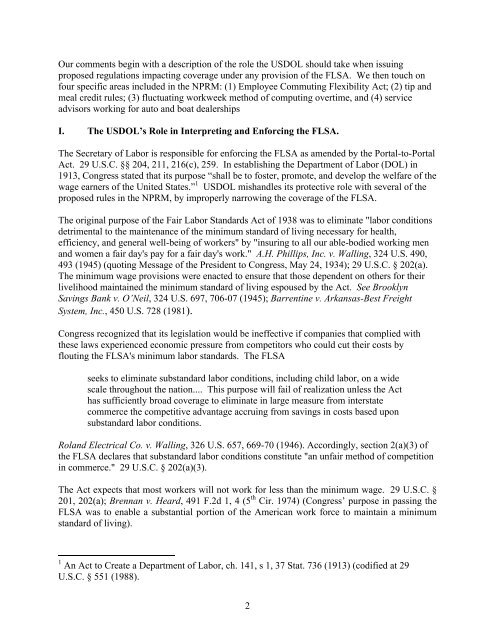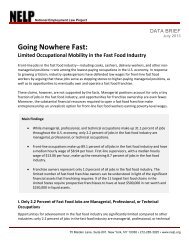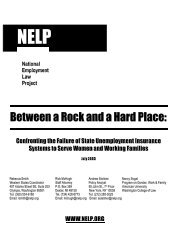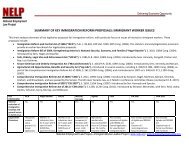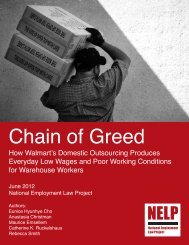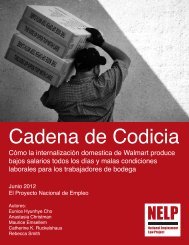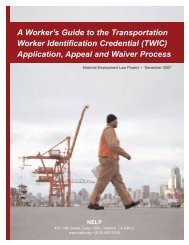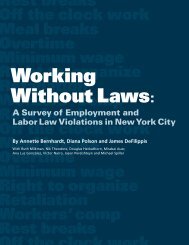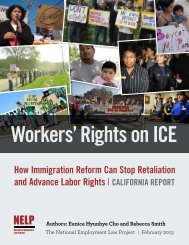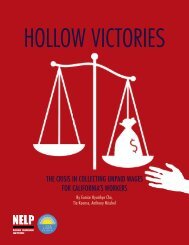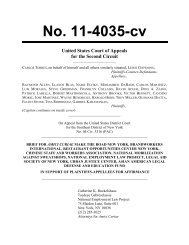National Employment Law Project
National Employment Law Project
National Employment Law Project
Create successful ePaper yourself
Turn your PDF publications into a flip-book with our unique Google optimized e-Paper software.
Our comments begin with a description of the role the USDOL should take when issuing<br />
proposed regulations impacting coverage under any provision of the FLSA. We then touch on<br />
four specific areas included in the NPRM: (1) Employee Commuting Flexibility Act; (2) tip and<br />
meal credit rules; (3) fluctuating workweek method of computing overtime, and (4) service<br />
advisors working for auto and boat dealerships<br />
I. The USDOL’s Role in Interpreting and Enforcing the FLSA.<br />
The Secretary of Labor is responsible for enforcing the FLSA as amended by the Portal-to-Portal<br />
Act. 29 U.S.C. §§ 204, 211, 216(c), 259. In establishing the Department of Labor (DOL) in<br />
1913, Congress stated that its purpose “shall be to foster, promote, and develop the welfare of the<br />
wage earners of the United States.” 1 USDOL mishandles its protective role with several of the<br />
proposed rules in the NPRM, by improperly narrowing the coverage of the FLSA.<br />
The original purpose of the Fair Labor Standards Act of 1938 was to eliminate "labor conditions<br />
detrimental to the maintenance of the minimum standard of living necessary for health,<br />
efficiency, and general well-being of workers" by "insuring to all our able-bodied working men<br />
and women a fair day's pay for a fair day's work." A.H. Phillips, Inc. v. Walling, 324 U.S. 490,<br />
493 (1945) (quoting Message of the President to Congress, May 24, 1934); 29 U.S.C. § 202(a).<br />
The minimum wage provisions were enacted to ensure that those dependent on others for their<br />
livelihood maintained the minimum standard of living espoused by the Act. See Brooklyn<br />
Savings Bank v. O’Neil, 324 U.S. 697, 706-07 (1945); Barrentine v. Arkansas-Best Freight<br />
System, Inc., 450 U.S. 728 (1981).<br />
Congress recognized that its legislation would be ineffective if companies that complied with<br />
these laws experienced economic pressure from competitors who could cut their costs by<br />
flouting the FLSA's minimum labor standards. The FLSA<br />
seeks to eliminate substandard labor conditions, including child labor, on a wide<br />
scale throughout the nation.... This purpose will fail of realization unless the Act<br />
has sufficiently broad coverage to eliminate in large measure from interstate<br />
commerce the competitive advantage accruing from savings in costs based upon<br />
substandard labor conditions.<br />
Roland Electrical Co. v. Walling, 326 U.S. 657, 669-70 (1946). Accordingly, section 2(a)(3) of<br />
the FLSA declares that substandard labor conditions constitute "an unfair method of competition<br />
in commerce." 29 U.S.C. § 202(a)(3).<br />
The Act expects that most workers will not work for less than the minimum wage. 29 U.S.C. §<br />
201, 202(a); Brennan v. Heard, 491 F.2d 1, 4 (5 th Cir. 1974) (Congress’ purpose in passing the<br />
FLSA was to enable a substantial portion of the American work force to maintain a minimum<br />
standard of living).<br />
1 An Act to Create a Department of Labor, ch. 141, s 1, 37 Stat. 736 (1913) (codified at 29<br />
U.S.C. § 551 (1988).<br />
2


